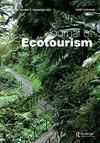影响加拿大公园和其他形式保护区的心理承诺和忠诚的因素
IF 2.4
Q2 HOSPITALITY, LEISURE, SPORT & TOURISM
引用次数: 1
摘要
我们使用心理承诺模型来更好地理解提高对公园和保护区行为忠诚的各种动机。心理承诺反映了一个人对某一特定现象的认同、了解和自由选择的程度,而这些因素反过来又会导致更大的忠诚度和对替代方案的抵抗力。我们收集了来自加拿大阿尔伯塔省634名公园游客的数据,测试了可能与这一承诺过程相关的人口统计学差异和动机。女性比男性更有可能把去公园看作是她们身份的反映,而且在去公园的时候也有更强的意志力。老年人想要了解更多关于公园的事情,也有更大的总体承诺。社会心理、精神和经济动机与承诺的关联各不相同,但这些关联总是积极的。人口学特征对动机的影响微乎其微。最后,对承诺的综合评估与更高的行为忠诚度相关(例如,公园访问的持续时间和次数)。公园机构可以利用这些发现来吸引和留住游客,并促进公园体验,特别强调动机和人口变化。本文章由计算机程序翻译,如有差异,请以英文原文为准。
Factors affecting psychological commitment and loyalty to parks and other forms of protected areas in Canada
ABSTRACT We use a model of psychological commitment to better understand the diverse motivations that enhance behavioural loyalty to parks and protected areas. Psychological commitment reflects the degree to which an individual identifies with, wants to learn about, and chooses freely to engage with a particular phenomenon, and these factors, in turn, lead to greater loyalty and resistance to alternatives. With data collected from 634 park visitors in Alberta, Canada, we tested demographic variation and motivations that may be linked to this process of commitment. Women were more likely than men to see park visits as a reflection of their identities and also had a greater sense of volition regarding park visits. Older adults wanted to know more about the parks and also had a greater overall level of commitment. Psycho-social, spiritual, and economic motivations varied in terms of their associations with commitment, but these associations were always positive. Few variations in motivations by demographic characteristics were found. Finally, a combined assessment of commitment was associated with greater behavioural loyalty (e.g. duration and number of park visits). Park agencies can use these findings to attract and retain visitors and facilitate park experiences, with special emphasis on motives and demographic variations.
求助全文
通过发布文献求助,成功后即可免费获取论文全文。
去求助
来源期刊

Journal of Ecotourism
Social Sciences-Geography, Planning and Development
CiteScore
6.40
自引率
12.50%
发文量
32
期刊介绍:
The Journal of Ecotourism seeks to advance the field by examining the social, economic, and ecological aspects of ecotourism at a number of scales, and including regions from around the world. Journal of Ecotourism welcomes conceptual, theoretical, and empirical research, particularly where it contributes to the dissemination of new ideas and models of ecotourism planning, development, management, and good practice. While the focus of the journal rests on a type of tourism based principally on natural history - along with other associated features of the man-land nexus - it will consider papers which investigate ecotourism as part of a broader nature based tourism, as well as those works which compare or contrast ecotourism/ists with other forms of tourism/ists.
 求助内容:
求助内容: 应助结果提醒方式:
应助结果提醒方式:


